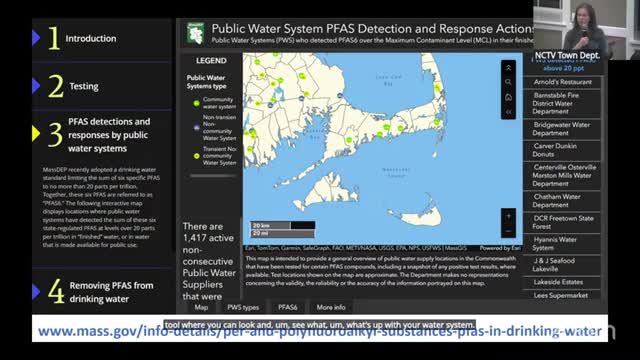Nantucket health officials, researcher say private wells show mixed PFAS results; town provides testing but will not reimburse
Get AI-powered insights, summaries, and transcripts
Subscribe
Summary
Health department and Dr. Laurel Shader reviewed municipal and private-well PFAS testing on Nantucket, reported follow-up sampling (~500 wells) with about 10% exceeding the state PFAS6 standard, and outlined testing options, filtration tradeoffs and local resources; town will not reimburse private-well testing.
Nantucket health officials and visiting researcher Dr. Laurel Shader told residents that testing has found both non-detect wells and some private wells with PFAS above Massachusetts' 20 parts-per-trillion combined PFAS6 benchmark.
Andrew Shapiro, environmental contamination administrator in the Nantucket Health Department, said the town does not plan to reimburse private-well testing. "No — we're not planning to reimburse," Shapiro told a resident who asked whether the town would pay for private-well PFAS testing.
Shader summarized local and state testing data: earlier state-supported sampling of 41 private wells found a highest reported value of 51 ppt and roughly 12% exceeded the Massachusetts PFAS6 standard; follow-up testing described in the town's materials covered nearly 500 wells and showed about 10% exceeding the state benchmark. She also noted the town has a municipal well that was shut off in late 2022 after PFAS detection (reported at 55.5 ppt) and that the shut well has not supplied the distribution system for nearly three years.
For residents seeking testing, Shader and Shapiro said Barnstable County Lab is now state-certified to run PFAS analyses and the town can help people access testing. The presenters said the county lab's PFAS test is available for residents through the health department and that the lab fee is $265 per sample; the transcript lists testing for '16' or '18' PFAS compounds but the speaker's phrasing was unclear on the exact count.
Shader described filtration options for homeowners. Activated carbon and ion-exchange filters are effective for many long-chain PFAS, while reverse osmosis (RO) systems remove both long- and short-chain PFAS but generate substantial wastewater and may be constrained by septic rules (Title 5) that generally prohibit RO discharge to septic systems. Shader warned that short-chain PFAS are more likely to 'break through' carbon filters over time, so municipalities often change carbon media more frequently to manage short-chain passage.
On disposal, Shapiro said point-of-entry systems must be managed professionally and should not go to the landfill, while current rules allow spent point-of-use cartridges to be disposed in lined landfills. Both presenters and residents noted the broader challenge of dealing with PFAS-containing products and filter waste.
Shapiro and Shader pointed residents to posted slides and the town website for additional resources and reminded attendees of a follow-up public session on Dec. 11 that will focus on health effects.
What happens next: the Nantucket Health Department will post the recorded presentation and slides online and continue to provide access information for testing and local resources; residents are encouraged to contact the health department for testing assistance and to review the PFAS Exchange for interpretation tools.
